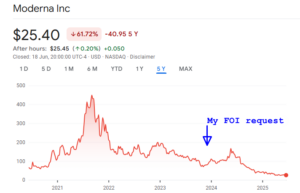
This post by Peter Selley details yet another Selley triumph. It’s extraordinary what focus and persistence can achieve.
I am dedicating this post to Nikki Rutman, twenty years an analyst with the FBI, who currently heads up Moderna’s Global Intelligence Division.
Moderna’s shares have plummeted since its 2021 Covid heyday. This appears unrelated to my FOI request which this post is about. But there may be a connection between my request and the uncertainty about the future of vaccines and Pharma with the advent of DJT and RFK. The pensions of many folk in the US may be at stake.
This uncertainty may be growing not simply due to events in the US or on a tiny island thousands of miles from the US coastline, Diego Garcia, but also here in the UK where Moderna and maybe Pharma has been dealt a mildly bloody nose over its attempts to control clinical trial information.
Listen
Do you want to know a secret?
Do you promise not to tell? (Lennon–McCartney)
Pharmaceutical companies have successfully hidden behind “commercial secrets” as an excuse for keeping their clinical trial Protocols and Investigators’ Brochures (IB) under wraps, even though it seems naïve to think any company would include secret information in documents that are routinely distributed to clinical trial centres around the world.
Should clinical trial documents be publicly available?
These documents are instruction manuals, specifying how the trial should be run, making sure all centres operate in the same way. They must be approved by ethical committees Institutional Review Boards.
The protocols contain details of who can or cannot be included in the trial, how participants are recruited etc. Without access to these documents, it is impossible to interpret the results properly. Additionally, they contain details of existing safety data (including animal studies) and precautions to protect the safety of participants. Trial results are often published in journals without the protocol being available.
There is no need for commercially sensitive information to be included. But Pharma claims there is secret information there and that makes the documents undisclosable.
Common sense suggests drug company commercial interests should never over-ride patient welfare.
Non-Disclosure
Under section 43 (Commercial interests) of the UK Freedom of Information Act 2000
- Information is exempt information if it constitutes a trade secret.
- Information is exempt information if its disclosure under this Act would, or would be likely to, prejudice the commercial interests of any person (including the public authority holding it).
Section 43 is a qualified exemption. This means that if the requested information is exempt from disclosure (either because the information is a trade secret or because of prejudice to commercial interests), the Health Research Authority (in this case) must consider whether the public interest in maintaining the exemption outweighs the public interest in its disclosure.
NextCOVE was a run of the mill RCT of Moderna’s Covid vaccine to compare safety, immunogenicity, and relative vaccine efficacy of mRNA-1283 compared with mRNA-1273 in participants aged ≥12 Years. As is often the case there was no placebo group.
The trial which started in March 2023 has now finished. No results have been formally published. There were 230 locations worldwide including 45 in the UK.
The trial raised eyebrows among some in the UK who were concerned that Moderna planned to recruit children as young as 12. How could they give informed consent? Covid had become a milder disease, especially in young people, who were also more prone to adverse events like myocarditis. It also appeared that Moderna initially proposed a reward of £1500 for children who took part. This is normal practice in USA and Canada but offering inducements for children is illegal in the UK.
Health Research Authority (HRA)
The HRA is responsible for regulating health research, including clinical trials. Clinical trials in the UK are approved by regionally based Ethical Committees, who rarely give a “negative determination” for a commercial clinical trial approval. This GSK RSV vaccine trial in babies was one of the few not approved. .
In August 2023, a concerned member of the public applied under FOIA to the HRA to be shown the protocol for the NextCOVE trial. Their request was refused, the HRA citing Section 43 of FOI Act – “Commercial Interests”.
This was strange as the HRA explains to drug companies:
“In the interests of transparency we would encourage you to make your protocol publicly available”.
The HRA explained that Moderna had advised [them] that the information contained:
“commercially sensitive information which … would be more likely than not to significantly prejudice … commercial interests.” [and publishing] “would lead to a harmful impact on its business.”
As regards the Public Interest test, the HRA claimed it
“relies on sponsors to submit confidential information to enable the HRA to carry out its regulatory functions. Disclosing information which relates to trade secrets, or which is commercially sensitive could impact on the HRA’s ability to carry out these functions through damage to trust or relationships.”
The Information Commissioner’s Office (ICO) which monitors FOI requests in UK threw out the complaint that follow the HRA denial of access.
My FOI Request
I had previously obtained trial protocols from HRA under FOIA. I was surprised to see disclosure was blocked for this vaccine trial.
On 3 Dec 2023 I applied to the HRA under FOI for Safety Information about the new product mRNA-1283, as I was particularly interested in the results of preclinical tests in animals. I also asked for the NextCOVE Protocol and IB to be disclosed.
The HRA again refused, on the same grounds. I asked for an internal review. Steve Tebbutt, the HRA’s secretary, maintained their position.
In February 2024, I used my right to complain to the Information Commissioner.
The ICO advise that:
“If you have regulatory functions, you may hold commercially sensitive information obtained via your regulatory activities (eg about the quality of a particular product or an organisation’s practices). There are strong public interest arguments in allowing access to information which helps protect the public from unsafe products or dubious practices.”
As part of their investigation, ICO asked the HRA to identify the information in the withheld documents that was commercially sensitive. HRA replied that their views were the same as in the previous complaint. HRA similarly did not comment when the ICO asked if it was likely that secret information would be included in the documents that were sent to over 200 clinical trial centres around the world.
Mr Tebbutt – who has been at HRA for years – stated:
“If we were to redact the document it would, for the most part, be the majority of the document which is withheld. This is because the commercially sensitive information is spread throughout the document…”
He did not respond when the ICO pointed out that it was:
“unlikely that every sentence and paragraph is a trade secret or other commercially sensitive information.”
Nevertheless, the ICO seemed swayed by HRA’s argument and dismissed my complaint on the same grounds – Section 43 (2).
I decided to appeal the ICO decision to the General Regulatory Chamber (GRC) of the Tribunals Service – part of the Ministry of Justice. At an early stage the HRA said they didn’t want to be involved, and the Information Commissioner said they wouldn’t attend the appeal hearing.
On 3 March I had my video appeal, which lasted about 90 minutes. The panel of three were pleasant. On May 12, I received the decision – I won. Selley v The information Commissioner. The HRA must disclose the information I requested in its entirety.
The GRC did not invoke the public interest test. They gave a clear warning that they did not approve of Pharma including commercially sensitive information in protocols, so as to avoid FOI disclosures. There was no appeal by ICO or HRA. The HRA sent me Moderna’s documents on 17 June.
The Tribunal’s decision, which while not legally binding, should make it harder for the HRA and others to use the “confidential commercial information” excuse to avoid disclosing clinical trial documents in the future.
I was pleased but had some unanswered questions.
- Is this the result of an invasion by bureaucrats?
It appears that the only opinions sought were those of Moderna, the ICO and HRA without input from clinicians or scientists.
- Where does Moderna’s claimed “special relationship” with the UK government fit in?
- Why couldn’t the Information Commissioner be bothered to turn up to the hearing?
- Is Stephen Tebbutt worried about upsetting Pharma? He said that:
“Disclosing information which relates to trade secrets, or which is commercially sensitive could impact on the HRA’s ability to carry out these functions through damage to trust or relationships.”
- Why do government agencies like HRA and MHRA and FDA put so much energy into obstructing FOI requests?
Here is an example of the lengths Moderna will go to prevent their protocols from being disclosed.
Less than a year ago Moderna abandoned a clinical trial of mRNA RSV vaccines in babies as several vaccinated babies were hospitalised with severe chest infections.
Moderna’s Matthew Snape, who was awarded an honor in the 2024 King’s New Years Honours list for services to public health, wrote an article about the tragic trial. This was (and still is) at the preprint (non-peer-reviewed) stage.
It was written by four ghosts:
“Medical writing and editorial assistance were provided by Jessica Nepomuceno, PhD, Renee Gordon, PhD, Kate Russin, PhD, and Ashlea Inan, PhD, of MEDiSTRAVA.”)
Here is what they originally wrote about the Trial Protocol:
Having read the last sentence, I headed over to clinicaltrials.gov where I was surprised to find – NO PROTOCOL.
Thinking that there must have been an oversight I emailed Matt (no reply) and posted a comment on the preview website.
A short while afterwards, rather than sharing the protocol on clinicaltrials.gov, Snape’s paper was surreptitiously altered, and history has been rewritten. WHY?
15 years ago Peter Gøtzsche and Anders Jørgensen asked the European Medical Agency (EMA) for clinical trial information about weight-loss drugs. The request was refused, citing commercial sensitivity. They appealed to the European Commissioner (the equivalent of the ICO) who personally inspected the pharmaceutical companies’ information. His opinion was that there was no sensitive information in the documents and ordered the EMA to release the documents. The process took three years.
Here is a list of Complaints against Moderna upheld by the PCMA (the industry’s self-regulatory body).
Additionally, Moderna misled PCMA investigators by failing to provide a full and frank disclosure of all the facts in its response to a previous case. The Appeal Board issued a Public Reprimand as it:
“considered that a lack of transparency in this regard was completely unacceptable”.
Advertised incentives like this (Moderna) are not permitted to entice children to participate in clinical trials.
On 13 March, Ashley Dalton MP, in a Parliamentary Response to a question about Moderna’s regulatory failings, stated:
“Where doubts about the safety, conduct, or scientific validity of a clinical trial are identified, the MHRA may take action, in line with the UK CTR, which could include requiring changes to be made to the trial protocol, or suspension or termination of a trial”.
We Have No Secrets
We tell each other everything (Carly Simon)
After I won my appeal, someone unbeknown to me requested the same information from the HRA. The two documents were disclosed to them before I received them. They have posted the Top Secret Information online for all to see.
Why did the HRA and ICO both claim these documents contain so many potentially financially damaging revelations they couldn’t even be redacted?
Can anyone see any likelihood this disclosure will have a harmful impact on Moderna’s business?
All comments welcome. Is anyone hopeful this decision might open a door to real change? Is Moderna slipping down the tube? Would a Moderna demise pose pension problems?





https://www.hartgroup.org/another-legal-loss-for-moderna/
GOOD NEWS: the important recent decision, by the First Tier Tribunal on information rights, overturns the decision by the NHS’s Heath Research Authority (HRA) [and supported by the Information Commissioner’s Office (ICO)] to deny public access to the study protocol and Investigators’ Brochure for Moderna’s NextCOVE covid vaccine study. Many congratulations and thanks must go to Dr Peter Selley whose admirable determination and perseverance are entirely responsible for this success. Whilst Dr Selley’s principal motivation for pursuing this case was more concerned with the balance of public versus commercial interests than the rights and wrongs of NextCOVE, his success will help to shine a light on the absence of ethical justification for this study. Read the full judgement here.
What Sparked Moderna Stock Crash?
https://www.forbes.com/sites/greatspeculations/2025/06/10/what-sparked-moderna-stock-crash/
The main reason for the downturn in Moderna’s stock is a significant drop in the demand for its COVID-19 vaccine. After experiencing remarkable growth during the pandemic with its groundbreaking mRNA vaccine, the company is now transitioning to a seasonal vaccine market, which has drastically affected sales.
Trump administration cancels $766 million Moderna contract to fight pandemic flu
https://www.independent.co.uk/news/trump-moderna-health-and-human-services-department-scientists-b2759683.html
UK cements 10-year-partnership with Moderna in major boost for vaccines and research
https://www.gov.uk/government/news/uk-cements-10-year-partnership-with-moderna-in-major-boost-for-vaccines-and-research
the details of the strategic partnership between the government and Moderna are commercially sensitive
This is fabulous, Peter. What a nail biter – and you won! A one-man triumph for patient welfare over corporate greed and dodgy special relationships. It is quite extraordinary ,how little, if at all, the welfare of human beings features in these trials – or indeed medicine generally these days.
After all that, I thought I’d better read the protocol looking for the commercially juicy bits, but as far as I could see – there weren’t any. Although I must confess by page 41 I was beginning to glaze over – well, slightly before actually.
As far as I could tell, the new product’s ‘USP’, using an old school consumer marketing term, was that it was essentially a convenient fridge pack. There was a huge difference in dosage levels , the new one being seemingly a much lower dosae – Spikevax LIte– I wondered why? And I couldn’t understand why the covid variants it was designed to immunise against seemed to be the old defunct omicrons. I thought were already dead. Quite likely I’m confused. Mind you I thought the covid ‘emergency’ was long dead too:
‘..though some people are being hospitalised and dying, Chin-Hong says the vast majority of people will either be asymptomatic or experience a cold so mild that some might well mistake it for a seasonal allergy, such as a pollen complaint.’
https://www.bbc.co.uk/future/article/20250113-why-covid-19-is-becoming-less-deadly
As you said, the trial hasn’t reported yet – but keen to bolster their flailing stock, there appeared to be a gung-ho interim report from Moderna on their investors’ page. They were tremendously excited to announce that the new product delivered better against ‘both the Omicron BA.4/BA.5 and original virus strains of SARS-CoV-2, the fridge pack was a surefire winner – and the vaccine worked best amongst the highest risk 65+ age group.
This left hanging the bigger question of what it was doing to younger people – as young as 12. Why on earth were these kids included? ‘The most common solicited systemic adverse events included headache, fatigue, myalgia and chills’. I don’t care about common – I want to know about disabling or even lethal. What about myocarditis?
https://investors.modernatx.com/news/news-details/2024/Moderna-Achieves-Positive-Interim-Results-from-Phase-3-Trial-of-Next-Generation-COVID-19-Vaccine/default.aspx
Inspirational achievement and post.
Thank you Peter.